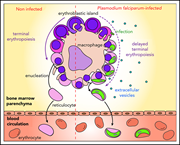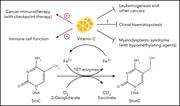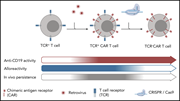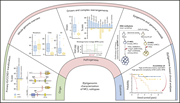Issue Archive
Table of Contents
BLOOD COMMENTARIES
PLENARY PAPER
Plasmodium falciparum sexual parasites develop in human erythroblasts and affect erythropoiesis
Malaria gametocytes develop in the bone marrow, as only mature parasites circulate and can infect mosquitoes. In a Plenary Paper, the authors elegantly delineate novel aspects of the process of maturation of gametocytes, demonstrating that they infect erythroblasts in the bone marrow niche and delay their maturation to allow for full parasite development.
BLOOD SPOTLIGHT
TET family dioxygenases and the TET activator vitamin C in immune responses and cancer
Vitamin C is a cofactor for TET family enzymes, and loss-of-function mutations are prevalent in hematologic malignancy. In a Blood Spotlight, Yue and Rao review the current understanding of the potential role of vitamin C and TET proteins in clonal hematopoiesis and hematologic malignancy.
CLINICAL TRIALS AND OBSERVATIONS
Impact of arginine therapy on mitochondrial function in children with sickle cell disease during vaso-occlusive pain
Clinical Trials & Observations
Brief Report
Arginine, the substrate for nitric oxide production, is deficient in patients with sickle cell vaso-occlusive crisis. Morris et al report improved markers of oxidant stress and mitochondrial stress in platelet-rich plasma from 12 patients treated with intravenous arginine, suggesting that arginine may offer a potential therapeutic intervention for sickle crisis.
IMMUNOBIOLOGY AND IMMUNOTHERAPY
Endogenous TCR promotes in vivo persistence of CD19-CAR-T cells compared to a CRISPR/Cas9-mediated TCR knockout CAR
Knockout of the endogenous T-cell receptor (TCR) offers the potential for HLA-mismatched “off-the-shelf” chimeric antigen receptor (CAR) T cells without risking GVHD. Stenger et al show that TCR-negative CAR T cells have strong antitumor activity without GVHD in mice. However, they have reduced persistence, increasing susceptibility to relapse.
LYMPHOID NEOPLASIA
Genomic and epigenomic insights into the origin, pathogenesis, and clinical behavior of mantle cell lymphoma subtypes
CME
Mantle cell lymphoma (MCL) is characterized by 2 major molecular subtypes, conventional and leukemic nonnodal MCL. In this month’s CME article, Nadeu et al investigate the genomic and epigenomic landscape of MCL to elucidate its complex genetic structure and characterize alterations that help to distinguish MCL subtypes.
THROMBOSIS AND HEMOSTASIS
Direct oral anticoagulants for cancer-associated venous thromboembolism: a systematic review and meta-analysis
In a meta-analysis of trials including over 2600 patients, the authors concluded that direct oral anticoagulants are an effective treatment for cancer-associated venous thromboembolism.
TRANSPLANTATION
Glucagon-like peptide 2 for intestinal stem cell and Paneth cell repair during graft-versus-host disease in mice and humans
Acute graft-versus-host-disease (GVHD) is associated with decreased intestinal stem cells (ISCs) and Paneth cells (PCs) following allogeneic hematopoietic cell transplant. In mouse models, treatment with teduglutide, a glucagon-like peptide-2 agonist, improves regeneration of ISCs and PCs and decreases GVHD, providing support for clinical trials of teduglutide for prevention of GVHD.
LETTERS TO BLOOD
More about complement in the antiphospholipid syndrome
Clinical Trials & Observations
BLOOD WORK
ERRATUM
CONTINUING MEDICAL EDUCATION (CME) QUESTIONS
-
Cover Image
Cover Image
![issue cover]()
Lysozyme (red)–positive Paneth cells in mice that developed graft-versus-host disease and were treated with the glucagon-like peptide 2 (GLP-2) analog teduglutide. See the article by Norona et al on page 1442.
- PDF Icon Front MatterFront Matter
- PDF Icon Table of ContentsTable of Contents
- PDF Icon Editorial BoardEditorial Board
Advertisement intended for health care professionals
Email alerts
Advertisement intended for health care professionals










Erythroblasts provide a home for gametocytes